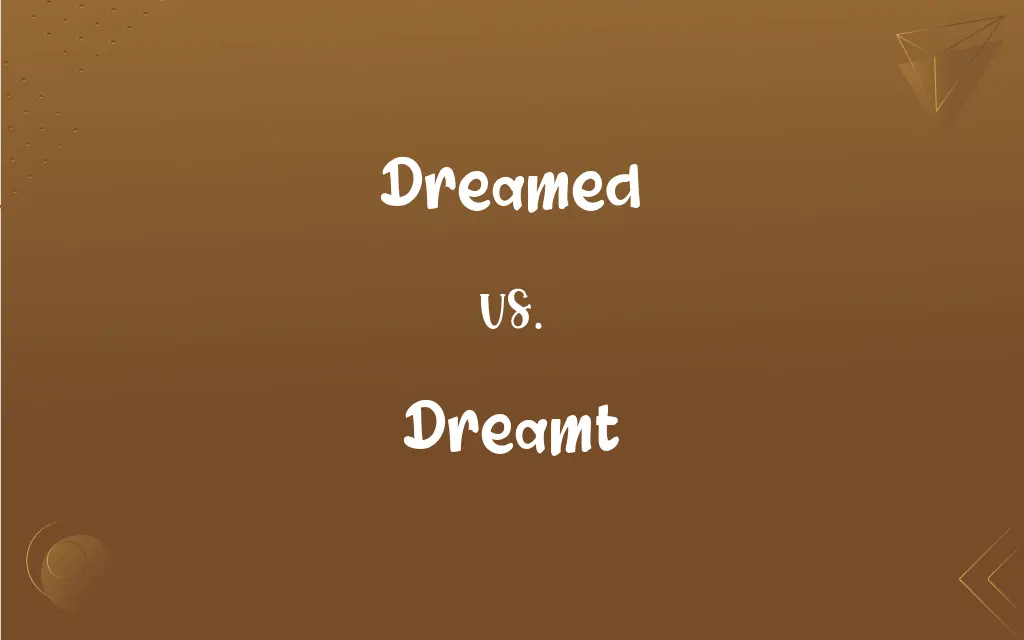Dreamed vs. Dreamt: What's the Difference?
Edited by Janet White || By Harlon Moss || Updated on October 17, 2023
"Dreamed" and "dreamt" both mean experiencing images/thoughts during sleep, but "dreamed" is common in American English, and "dreamt" is more used in British English.

Key Differences
"Dreamed" is the past tense and past participle of the verb "dream," used primarily in American English, indicating the experience of thoughts or images in the mind during sleep. On the other hand, "dreamt" carries the same meaning but is more commonly utilized in British English, serving as an alternative spelling that's considered more archaic or poetic.
In terms of usage, "dreamed" is more prevalent in written and spoken American English due to its conformity with the regular structure of forming the past tense by adding "-ed" to the base verb. In contrast, "dreamt" follows the irregular construction of past tense verbs, which is characteristic of many traditional British English forms.
Both "dreamed" and "dreamt" can also describe contemplating something as possible or hoping for an outcome, but again, the distinction in their usage lies primarily in the regional preference. While an American might say they "dreamed" of a successful career, a Brit is more likely to express they "dreamt" of it.
Pronunciation also sets "dreamed" and "dreamt" apart. "Dreamed" typically has a two-syllable pronunciation, emphasizing the '-ed,' sounding like 'dream-ed.' Conversely, "dreamt" is usually articulated as a single syllable, maintaining brevity and a smoother phonetic transition.
In summary, while "dreamed" and "dreamt" convey the same fundamental concept related to the mental activity during sleep or aspirational thinking, their difference is rooted in regional linguistic preferences, with "dreamed" being favored in American English, and "dreamt" more customary in British English.
ADVERTISEMENT
Comparison Chart
Usage
More common in American English
More common in British English
Spelling
Standard spelling with "ed"
Alternative spelling with "t"
Pronunciation
Typically two syllables: 'dream-ed'
One syllable: 'dreamt'
Form
Regular verb form
Irregular verb form
Literary feel
More contemporary
Considered more archaic or poetic
ADVERTISEMENT
Dreamed and Dreamt Definitions
Dreamed
Dreamed also means to have contemplated or imagined something as possible or desirable.
He always dreamed of becoming an astronaut.
Dreamt
Dreamt is to have experienced scenes, ideas, or feelings in the mind while asleep.
She dreamt a bizarre sequence of events last night.
Dreamed
Dreamed, in literature, might imply a sense of longing or nostalgia for something.
She dreamed of the days when they were together.
Dreamt
Dreamt, in a narrative context, can suggest a wistful or yearning reminiscence.
She fondly dreamt of the times they had spent on the beach.
Dreamed
Dreamed can indicate the mental exploration of hopes or aspirations.
They dreamed big, aspiring to change the world.
Dreamt
Dreamt may also describe an unreal, idealized belief or condition.
In her utopia, everyone dreamt fearlessly, unbound by societal norms.
Dreamed
Dreamed is having experienced images, thoughts, or emotions in the mind during sleep.
I dreamed of a serene forest last night.
Dreamt
Dreamt also refers to considering something potential or wished for while awake.
He had dreamt of visiting far-off galaxies since childhood.
Dreamed
Dreamed can also refer to an idealized or fictional belief or state.
He dreamed a perfect world, free of suffering.
Dreamt
Dreamt implies mentally embracing desires or targets.
They dreamt boldly, aiming to inspire others.
Dreamed
A series of images, ideas, emotions, and sensations occurring involuntarily in the mind during certain stages of sleep.
Dreamt
A past tense and a past participle of dream.
Dreamed
A daydream; a reverie.
Dreamt
Simple past tense and past participle of dream
Dreamt
Or only extant in a dream or dreams.
FAQs
Is there a pronunciation difference between "dreamed" and "dreamt"?
Generally, "dreamed" can be pronounced as 'dream-ed,' while "dreamt" is a single syllable.
Is "dreamt" considered more poetic than "dreamed"?
Yes, "dreamt" is often viewed as more poetic or archaic.
Are there regional preferences for using "dreamed" vs. "dreamt"?
Yes, "dreamed" is prevalent in American English, while "dreamt" is more common in British English.
In American literature, is "dreamt" ever used for a specific effect?
Yes, American authors may use "dreamt" for stylistic, historical, or poetic effect.
In academic writing, should I favor "dreamed" or "dreamt"?
In American English, "dreamed" is standard; in British English, either is acceptable, but ensure consistency.
Does "dreamed" have more literary connotations than "dreamt"?
Not necessarily; both can be used in literary works, but "dreamt" may add an archaic or stylistic touch.
Would using "dreamt" in American English be considered incorrect?
Not incorrect, but it's less common and might stand out as stylistically distinct or archaic.
In speech, is there a preference for "dreamed" or "dreamt"?
In American English, people typically use "dreamed," while in British English, either could be used, with "dreamt" possibly sounding more formal or poetic.
Do "dreamed" and "dreamt" have the same grammatical functions?
Yes, both serve as the past tense and past participle of the verb "dream."
Can "dreamed" be used in formal writing?
Yes, "dreamed" is perfectly acceptable in both formal and informal contexts.
Is the meaning of "I dreamed" the same as "I had dreamt"?
Yes, but "I had dreamt" is the past perfect form, suggesting an action completed in the past before another past action.
Are there dialects that exclusively use "dreamt" over "dreamed"?
No specific dialect exclusively uses "dreamt," but it's more prevalent in British and some Commonwealth countries' dialects.
Are "dreamed" and "dreamt" interchangeable?
Yes, they are, but "dreamed" is preferred in American English, and "dreamt" is more common in British English.
Can "dreamed" and "dreamt" both refer to hopes and aspirations?
Yes, both can refer to things you imagine or wish for, not just experiences during sleep.
Is "dreamt" common in contemporary writing?
"Dreamt" is less common in American English but still used in contemporary British English.
Is one more correct than the other: "dreamed" or "dreamt"?
No, both are correct; the preference depends on regional usage and personal style.
Do "dreamed" and "dreamt" have different origins?
They stem from the same verb, "to dream," but "dreamt" is an older form.
Can "dreamed" and "dreamt" be used in the same sentence for style or emphasis?
While unusual, a writer might use both for stylistic purposes or to emphasize a point.
Does the use of "dreamed" over "dreamt" indicate a modernization of language?
It reflects regional and contemporary preferences more than a strict modernization.
How should I decide whether to use "dreamed" or "dreamt" in my writing?
Consider your audience (American or British), the context (formal or literary), and your stylistic preference.
About Author
Written by
Harlon MossHarlon is a seasoned quality moderator and accomplished content writer for Difference Wiki. An alumnus of the prestigious University of California, he earned his degree in Computer Science. Leveraging his academic background, Harlon brings a meticulous and informed perspective to his work, ensuring content accuracy and excellence.
Edited by
Janet WhiteJanet White has been an esteemed writer and blogger for Difference Wiki. Holding a Master's degree in Science and Medical Journalism from the prestigious Boston University, she has consistently demonstrated her expertise and passion for her field. When she's not immersed in her work, Janet relishes her time exercising, delving into a good book, and cherishing moments with friends and family.































































